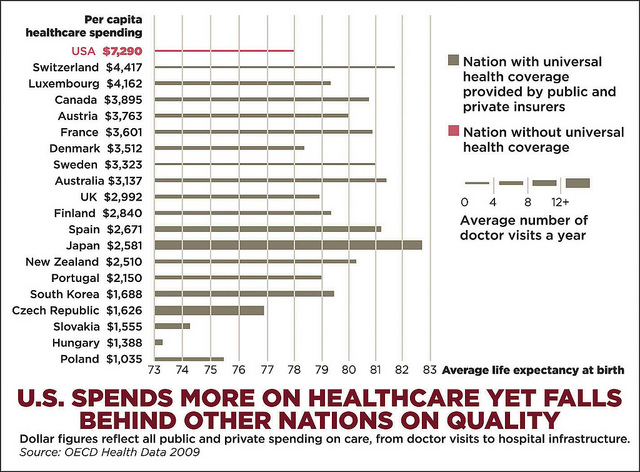Archive for June 2013
 Why Do I Strongly Advocate for a Single Payer System (Universal Healthcare)?
Why Do I Strongly Advocate for a Single Payer System (Universal Healthcare)?
I advocate for a single payer healthcare system because it is the best solution to the costly and inequitable healthcare system we have in the US currently. As a nation we pay twice as much as other industrialized countries for our healthcare, yet we get less coverage and cover only a portion of our population. Below is a chart illustrating these facts:
As you can see, in the US, we spend far more, we get fewer doctor visits per year, and we have lower life expectancies than other countries with universal healthcare. Single payer should not be a partisan issue. Rather, it should be recognized as a critical step towards improving US Healthcare. Below are some of my favorites statements for single payer healthcare reform:
Physicians for a National Health Plan
Single-payer national health insurance is a system in which a single public or quasi-public agency organizes health financing, but delivery of care remains largely private.
Currently, the U.S. health care system is outrageously expensive, yet inadequate. Despite spending more than twice as much as the rest of the industrialized nations ($8,160 per capita), the United States performs poorly in comparison on major health indicators such as life expectancy, infant mortality and immunization rates. Moreover, the other advanced nations provide comprehensive coverage to their entire populations, while the U.S. leaves 51 million completely uninsured and millions more inadequately covered.

The reason we spend more and get less than the rest of the world is because we have a patchwork system of for-profit payers. Private insurers necessarily waste health dollars on things that have nothing to do with care: overhead, underwriting, billing, sales and marketing departments as well as huge profits and exorbitant executive pay. Doctors and hospitals must maintain costly administrative staffs to deal with the bureaucracy. As a result, administration consumes one-third (31 percent) of Americans’ health dollars, most of which is waste.
Single-payer financing is the only way to recapture this wasted money. The potential savings on paperwork, more than $400 billion per year, are enough to provide comprehensive coverage to everyone without paying any more than we already do.
Under a single-payer system, all Americans would be covered for all medically necessary services, including: doctor, hospital, preventive, long-term care, mental health, reproductive health care, dental, vision, prescription drug and medical supply costs. Patients would no longer face financial barriers to care such as co-pays and deductibles, and would regain free choice of doctor and hospital. Doctors would regain autonomy over patient care.
Physicians would be paid fee-for-service according to a negotiated formulary or receive salary from a hospital or nonprofit HMO / group practice. Hospitals would receive a global budget for operating expenses. Health facilities and expensive equipment purchases would be managed by regional health planning boards.
A single-payer system would be financed by eliminating private insurers and recapturing their administrative waste. Modest new taxes, based on ability to pay, would replace premiums and out-of-pocket payments currently paid by individuals and business. Costs would be controlled through negotiated fees, global budgeting and bulk purchasing.
David May, MD, PhD
April 23, 2013
I am a Republican. For those who know me that is not a surprise. I live in a red state. I have never voted for a Democratic presidential candidate. I can field strip, clean and reassemble a Remington 12-gauge pump blindfolded. And on top of it, I think we should talk about having a single payer national health care plan. The reason is quite simple. In my view, we already have one; we just don’t take advantage of it.
Firstly, Medicare and the Center for Medicare and Medicaid Services (CMS) are de facto setting all of the rules now. They are a single payer system. When we go to lobby the Hill, we lobby Congress and CMS. Talking to Blue Cross, Aetna, Cigna and United Health care is essentially a waste of time. All the third party payers do is play off the Medicare rules to their advantage and profit. They have higher premiums, pay a somewhat higher benefit and have a significantly higher level of regulation which impedes the care of their customers. This is no longer consumer choice but effectively extortion, a less than hidden shake down in which the “choice” for a family of four is company A at $900 per month or company B at $1100 per month. The payers are simply taking advantage of the system, playing both ends against the middle.
Secondly, in order to move forward with true health care finance we need complete transparency in cost and expense… and we need it now. As was noted in a recent Time magazine piece on the hidden cost of health care, our current system is a vulgar, less than honorable construct more akin to used car sales than medical care, cloaked under the guise of generally accepted accounting principles and hospital cost shifting.
Thirdly, with a single payer system would potentially come real utilization data, real quality metrics and real accountability. The promise of ICD-10 with all of its difficulties is that of a much more granular claims-made data. We could use some granularity in health care data and we will never achieve it in big data quantities without a single payer system.
Lastly, I think that the physicians should be in charge of health care and not the insurance companies and hospital systems. With a single price structure, it becomes all about medical decision making, efficiency, the provision of care to our patients, and shared decision making, all of which we do well.
How, you might say, could a Republican come to such a position? The simple answer is I really think it is quite Republican. Oh, I know there will be many raised eyebrows and many critics. I accept that. I understand the fact that no single payer system is perfect, that it is “socialist,” that it is “un-American.”
I would submit to you, however, that it is un-American to allow many of our citizens to be uninsured, that it is un-American to shunt money away from a strong military in order to support a bloated, inefficient and fraud-laden health care system, that it is un-American not to be open and above board with the cost of what we do, the expense of that service and the profit that we make. Mostly, it is un-American to let this outrageous health care injustice continue.
– http://blog.cardiosource.org/post/i-am-a-republican-can-we-talk-about-a-single-payer-system-2/
President Richard Nixon, (Republican)
Feb 6, 1974
One of the most cherished goals of our democracy is to assure every American an equal opportunity to lead a full and productive life.
In the last quarter century, we have made remarkable progress toward that goal, opening the doors to millions of our fellow countrymen who were seeking equal opportunities in education, jobs and voting.
Now it is time that we move forward again in still another critical area: health care.
Without adequate health care, no one can make full use of his or her talents and opportunities. It is thus just as important that economic, racial and social barriers not stand in the way of good health care as it is to eliminate those barriers to a good education and a good job.
…These gaps in health protection can have tragic consequences. They can cause people to delay seeking medical attention until it is too late. Then a medical crisis ensues, followed by huge medical bills–or worse. Delays in treatment can end in death or lifelong disability…
Early last year, I directed the Secretary of Health, Education, and Welfare to prepare a new and improved plan for comprehensive health insurance. That plan, as I indicated in my State of the Union message, has been developed and I am presenting it to the Congress today. I urge its enactment as soon as possible.
The plan is organized around seven principles:
First, it offers every American an opportunity to obtain a balanced, comprehensive range of health insurance benefits;
Second, it will cost no American more than he can afford to pay;
…Under the Comprehensive Health Insurance Plan, a doctor’s decisions could be based on the health care needs of his patients, not on health insurance coverage. This difference is essential for quality care.
Every American participating in the program would be insured for catastrophic illnesses that can eat away savings and plunge individuals and families into hopeless debt for years. No family would ever have annual out-of-pocket expenses for covered health services in excess of $1,500, and low-income families would face substantially smaller expenses.
…Comprehensive health insurance is an idea whose time has come in America.
There has long been a need to assure every American financial access to high quality health care. As medical costs go up, that need grows more pressing.
– http://www.kaiserhealthnews.org/stories/2009/september/03/nixon-proposal.aspx
Conclusion
We already pay enough in taxes to fund a national single payer healthcare system– but we don’t get it.
We need to start having genuine dialogues about healthcare and I believe that can start at the local level. How is the current healthcare system effecting you and your neighbor? How many people in our community are suffering without financial access to healthcare? What can we do at the local level to alleviate this problem? I believe if local communities, hospital districts, cities, and counties begin actively and aggressively grappling with this challenge – we can develop innovative solutions and a lot of suffering might be eliminated. Moreover, this work will help clarify the benefits and need for a State or National single payer healthcare system.

